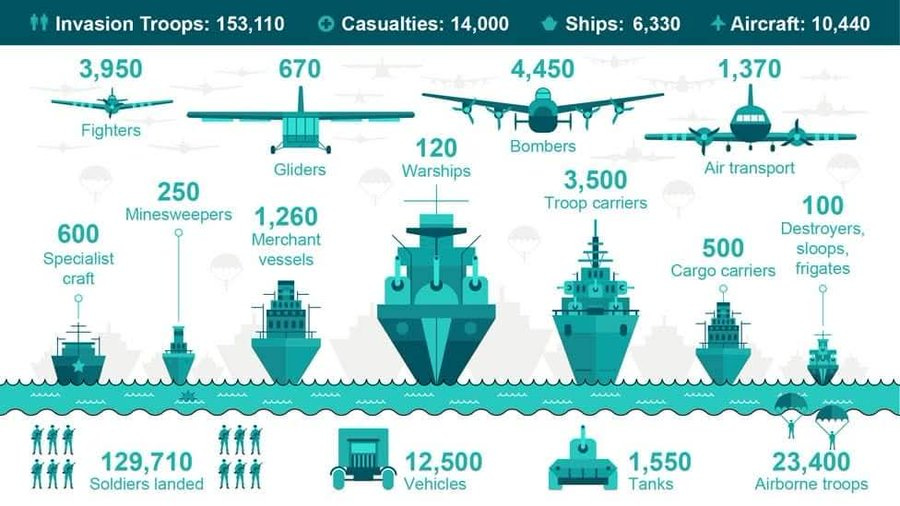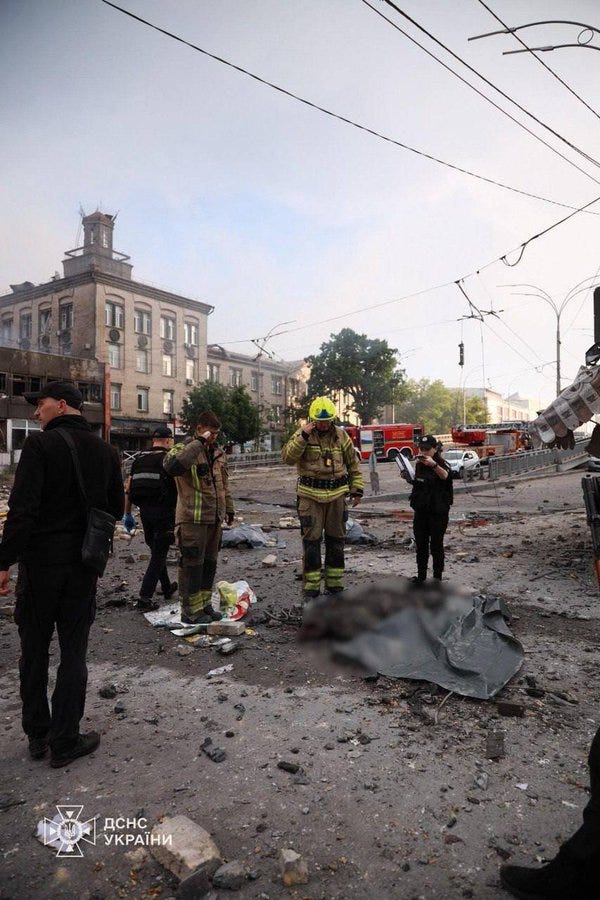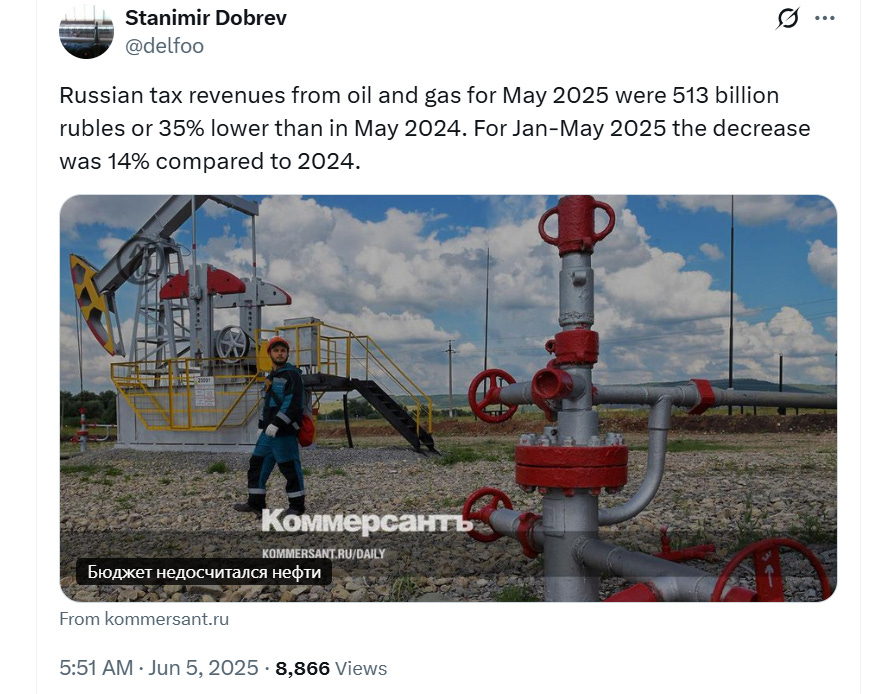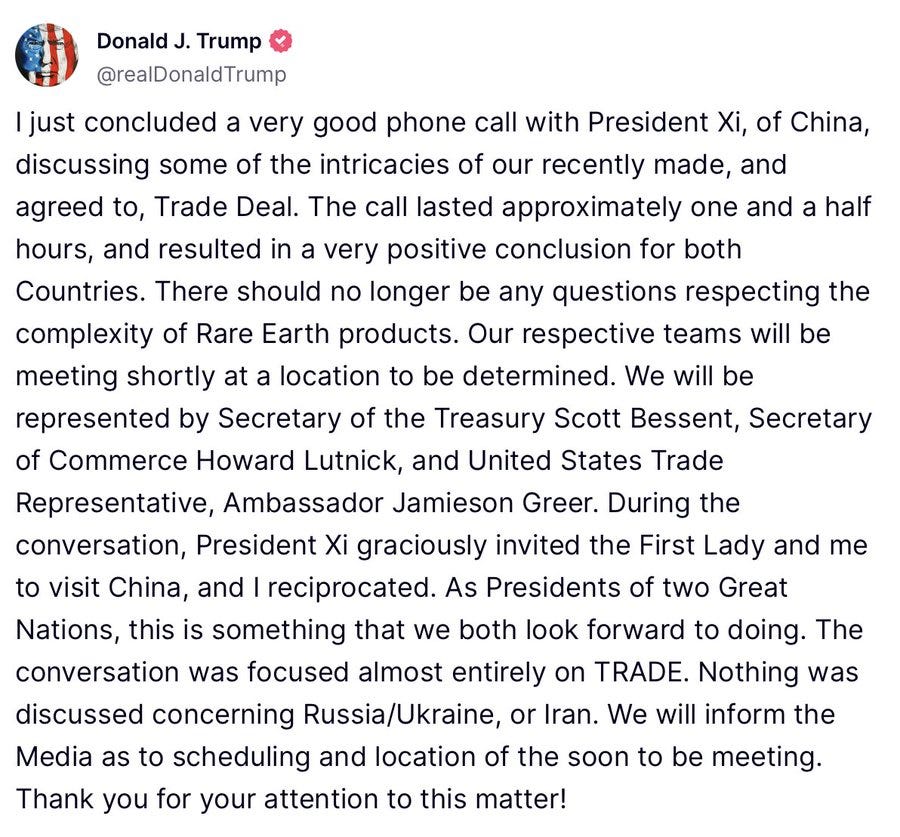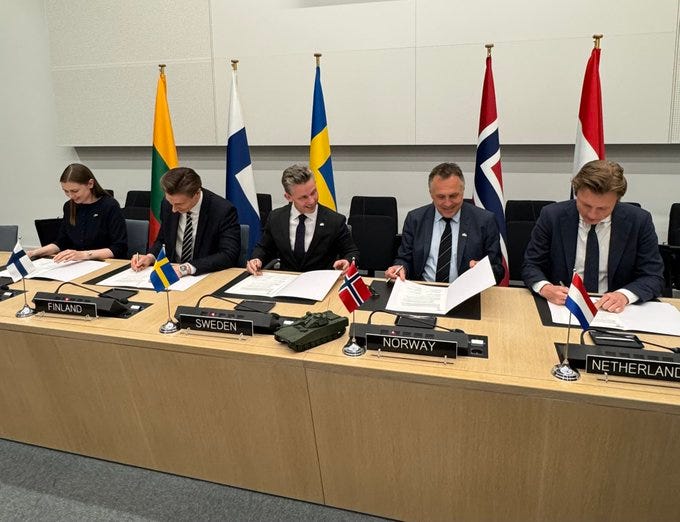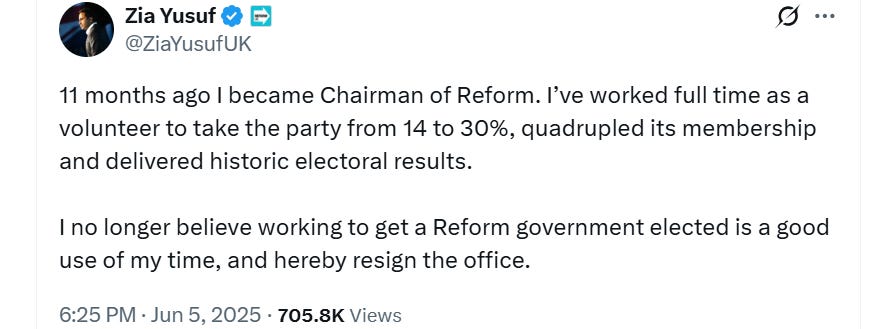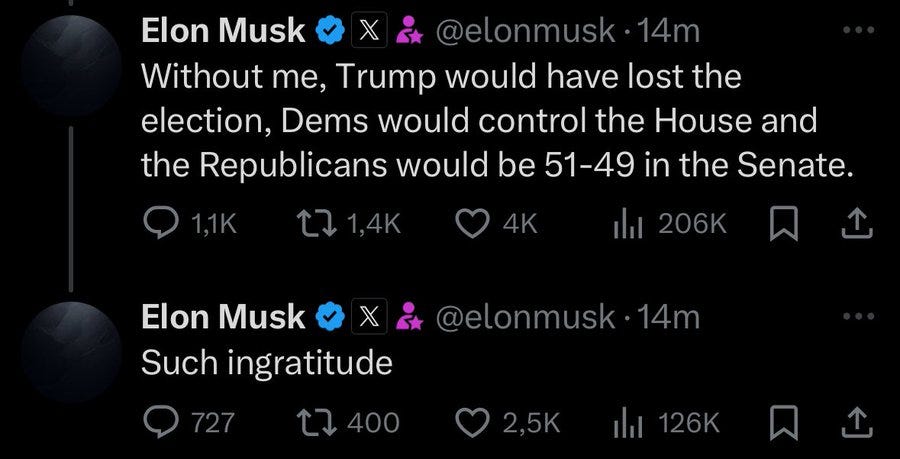Catching up…
For specific news about Trump, his regime and its dealings with Russia, I direct you to Olga’s substack. She and Julie Roginsky publish a weekly podcast, “Pax Americana”, which is highly informative.
For a general view of news from various geopolitical threatres, Scott’s EA Worldview is always superb.
There are simply no such peace initiatives in the world that Russia would not reject. They don't like everything. They only like ruins and murders. They must be held accountable for this.—President Zelensky
Stories we’re following…
June 6—D-Day Remembrance: On Friday we remembered and gave thanks to the soldiers and all the souls that fought for our freedom.
The Canadian forces landed on code-name Juno Beach—14,000 soldiers. Over 350 of them lost their lives that day.
Jim Parks, a rifleman with the Royal Winnipeg Rifles, landed on Juno Beach two minutes before the main assault wave and describes what it was like to be there.
5 killed, 73 injured in Russian attacks on Ukraine over past day. Russia attacked civilians in Ukraine with roughly 50 missiles and up to 400 drones — including Shaheds, Kalibrs, and ballistic missiles in the early hours of Friday morning. Kyiv, Lutsk, Lviv, Ternopil, Chernihiv, Kremenchuk, and others. Multi-storey buildings hit. Energy infrastructure damaged. There are killed and wounded people throughout the country.
In Kyiv, three Ukrainian State Emergency Service rescuers were killed while responding to the aftermath of Russian strikes. They worked under fire to save lives. Nine more were injured—some critically—and doctors are fighting for them. In Ternopil region, five rescuers were also injured while extinguishing a fire. All are receiving medical care.
Operation of the city’s metro transport system was disrupted because a Russian strike had hit and damaged a train between stations, the city’s military administration said. The air attack also triggered fires in residential buildings in different parts of the city, authorities said.
This is footage of four Russian missiles striking Lutsk in western Ukraine:
President Zelensky responds to Russia’s massive overnight strikes:
Russia hasn’t changed its tactics—another large-scale attack on our cities and civilian life. Over 400 drones and 40+ missiles, including ballistic. Dozens wounded, 3 rescuers killed.
Russia must be held accountable. The world can stop this—by pressing Russia now. Inaction means complicity.
Since the first minute of this war, they have been striking cities and villages to destroy life.
We’ve done a lot together with the world to enable Ukraine to defend itself.
But now is exactly the moment when America, Europe, and everyone around the world can stop this war together by pressuring Russia.
If someone is not applying pressure and is giving the war more time to take lives – that is complicity and accountability. We must act decisively.
Firemen in Kyiv salute the body of their fallen colleague – killed while saving others after Russian missiles targeted residential buildings this morning.
Ukraine launched more than 170 drones at Russian airbases overnight, per Russia's Defense Ministry. The Engels airbase in Saratov—home to concentrated Russian aviation—was hit, causing significant damage. The Dyagilevo airbase in Ryazan, hosting aerial refuelers and escort fighters used in missile strikes on Ukraine, was also targeted. Additionally, multiple fuel tanks in Saratov caught fire, resulting in a large blaze, the General Staff confirms.
Fuel storage tanks at-- or adjacent to -- the Engels air base (home to Tu-160 strategic bombers) were hit as well as the “Progress” plant in Michurinsk, which produces equipment for missile, aviation, and energy infrastructure.
Follow up: A Russian Mi-8 helicopter was destroyed and a Mi-35 was damaged following an attack on Bryansk airport overnight, according to ASTRA sources.
Combat Situation
Russia is increasingly using motorcycles for assault operations, particularly near Toretsk, reports Lt. Col. Dmytro Zaporozhets, spokesperson for the "Luhansk" group of forces. In two recent attacks near Yablunivka, half of the personnel and vehicles were destroyed.
Graham Slattery: One striking claim at a briefing given by Yermak and other Ukrainian officials to journalists this evening: Per Ukrainian military intelligence, Russia’s goal is to capture part of Kyiv by end-2026.
"Unfortunately, they are not speaking about peace. They are preparing for war," President Volodymyr Zelensky's Deputy Chief of Staff Pavlo Palisa said.
Russia plans to cut Ukraine off from the Black Sea in 2026, says Zelenskyy’s deputy Palisa. Aims to take the so-called "LNR/DNR" by fall, set a border buffer by year-end, and seize Dnipro’s left bank, Odesa, and Mykolaiv next year.
Yandex has inadvertently revealed the locations of sensitive military and defense industry sites in Moscow. By applying visible blurring to these areas on its maps, the company made it easier to identify their exact locations.
'Not destroyed but damaged' — Russia claims it will repair bombers struck in Operation Spiderweb. In addition to supply-chain challenges brought upon economic sanctions, Russia would also likely face challenges due to the complexities of Soviet-era technology present in the aircraft, if it were to attempt to restore the bombers.
Long queues formed at the Chonhar checkpoint between occupied Crimea and Kherson, as trucks undergo thorough inspections, on Friday.
Putin didn’t take the news about operation SPIDERWEB well…
Behind the Lines
Two German Eurofighter jets were scrambled on Thursday 5 June due to the presence of a Russian reconnaissance aircraft over the Baltic Sea, as reported by DPA. The Russian Il-20 aircraft was flying in international airspace over the Baltic Sea without transmitting identification signals or establishing communication, the German Bundeswehr stated. In response, NATO dispatched fighter jets from the German Air Force stationed at Rostock-Laage Airbase.
Chatham House will host a conversation with NATO chief Mark Rutte. Register for the event here.
Merz: Europe is capable of sustaining Ukraine’s resistance against Russia, even if the United States were to decide to completely halt its military support to Kyiv, the senior military official in charge of coordinating Germany’s arms supplies told Reuters.
Major General Christian Freuding said Nato’s European members plus Canada had already exceeded the estimated $20 billion worth of US military aid provided last year to Kyiv. They accounted for around 60% of the total costs borne by the Western allies, he said.
“The war against Ukraine is raging on our continent, it is also being waged against the European security order. If the political will is there, then the means will also be there to largely compensate for the American support,” Freuding said in an interview.
Reuters: Germany will need up to 60,000 additional troops under new NATO targets for weapons and personnel, Defence Minister Boris Pistorius said on Thursday, as the alliance beefs up its forces to respond to what it sees as an increased threat by Russia. "We are stepping up to our responsibility as Europe's largest economy," the minister told reporters ahead of a meeting with his NATO counterparts in Brussels that was set to approve the new targets.
Canadian armored vehicle manufacturer Roshel has launched local production in Ukraine, according to CEO Roman Shimonov. The facility began operating two months ago, though its location remains undisclosed for security reasons.
WSJ: Iran has ordered thousands of tons of ingredients for ballistic missiles from China. Deliveries from China are expected to begin in the coming months to Iran and its affiliated groups in other regions, such as Yemen's Houthis. The new contract for ammonium perchlorate could be enough for Iran to produce 800 missiles.
Ukraine and Japan’s JICA have signed an agreement enabling a $3 billion disbursement under the G7’s ERA initiative. The funds—backed by revenues from frozen Russian assets—will support Ukraine’s priority budget needs and economic development. PM Shmyhal thanked Japan and G7 partners for a mechanism that makes Russia pay.
Merz reveals more on his Trump talks, warns of 'no clear understanding' of Russian armament.
Setting the scene in a speech during a family entrepreneurs’ events, he said that “whether we like it or not, we will remain dependent on the United States, on America, for a long time to come.”
He separately said that the Trump administration was “open for discussions” and "to hear other opinions,” Reuters reported, as he insisted: “you must speak with Trump, not about him.”
On Ukraine, he said that “in Washington there seems to not be a clear understanding of the extent of Russian armament.”
But more broadly on Nato, he felt assured that “Trump was clear about not taking the US out of Nato.”
Trump on when he’ll impose tough sanctions on Russia: it’s in his brain.
“Yeah, I’m with Ukraine. We just signed a big deal on rare earth with Ukraine, and…You know what I’m for, stopping killing, really, that’s what I’m for again, a war that would have never started, should have never started.” (Mo: it’s really getting old.)
There’s more: 'Sometimes you’re better off letting them fight,’ Trump says on Russia-Ukraine war. President Donald Trump likened the war between Russia and Ukraine to a fight between two children in a park, suggesting it might be better to let them clash for a while before stepping in, given the depth of animosity between them.
Meanwhile in Russia & China…
The average maximum rate on deposits in the top 10 retail banks, which is calculated by the Central Bank, fell to 19.4% in the last ten days of May. This is the minimum since the end of September, when the average rate was 18.7%. Deposit rates peaked at 22.3% in mid-December, when everyone was preparing for a key rate hike to 23%. Since then, the average maximum rate has fallen by almost 3 percentage points (pp). Now, on the contrary, the market is preparing for a key rate cut: if not this Friday, then in July. (Mo: this is important. Madi Kapparov will be providing analysis about what this could mean for Russia.)
More than 3,000 schools without sewerage and running water have been counted in Russia. Thousands of Russian schools are not equipped with basic amenities. According to data for 2024, 3.9 thousand general education institutions have no sewage system, 3.4 thousand have no running water, and 3.5 thousand have no central heating, the If byt' Tochnom project calculated after studying documents from the Ministry of Education. The worst situation is in Tuva. More than half of the schools there do not have sewage system. In second place are Dagestan and Yakutia, where 41% of such educational institutions are not equipped with normal toilets.
From January to May 2025, Russian companies published 15% fewer vacancies than in the same period in 2024, according to data from the hh.ru service, cited by Vedomosti. The search for employees in the section "Human Resources Management, Training" has decreased by 35%, in "Automotive Business" by 25%, in "Agriculture" by 23%, the number of vacancies in the categories "Transport, Logistics, Transportation", "Strategy, Investments, Consulting" and "Purchases" has decreased by 20%, according to the calculations. The analysis of the labor market of the portal SuperJob confirms this trend: the total number of vacancies in Russia has fallen by 11% in a year.
Oligarchs lose their court cases to get sanctions lifted: Those who appealed the decision to the ECJ included Dmitry Mazepin (Uralchem), Dmitry Pumpyansky (TMK, Sinara Group), Viktor Rashnikov (MMK), German Khan (Alfa Group) and Tigran Khudaverdyan (Yandex). Their applications were rejected in 2023 and they appealed. Before delivering its final verdict, the court instructed one of its legal advisers to provide an opinion on their complaints. The opinion is not binding on the ECJ, but in most cases the court rules in accordance with it.
The International Aviation and Space Salon (MAKS), which was supposed to be held in Zhukovsky near Moscow this summer, will not take place again, Interfax reports , citing two sources familiar with the situation. The country's largest aviation equipment show, which has been held since 1993 and acquired federal status in the mid-2000s, has been cancelled for the third year in a row.
Post Trump-Xi meeting official statements. The Official Chinese readout follows.
June 5: Official Chinese readout of Xi-Trump phone call
President Xi Jinping pointed out that to correct the course of the "ship" of China-US relations, both sides must steer the helm and set the direction firmly, especially by eliminating various interferences and even sabotage—which is particularly crucial.
At the US proposal, the two countries’ economic and trade heads held talks in Geneva, marking an important step in resolving trade issues through dialogue and consultation. This move has been widely welcomed by both nations and the international community, proving that dialogue and cooperation are the only correct choice. The two sides should make good use of the established economic and trade consultation mechanisms, uphold an equal attitude, respect each other’s concerns, and strive for win-win results. On this, China is sincere but also principled. The Chinese people always honor their words with actions.
Since consensus has been reached, both sides should abide by it. After the Geneva talks, China has implemented the agreement seriously and earnestly. The US should objectively assess the progress made and roll back its negative measures against China. The two sides should enhance exchanges in diplomacy, trade, military affairs, law enforcement, and other fields to build consensus, reduce misunderstandings, and strengthen cooperation.
Xi stressed that the US should handle the Taiwan issue with caution to prevent a very small number of "Taiwan independence" separatists from dragging China and the US into a dangerous situation of conflict and confrontation.
Trump expressed his great respect for President Xi, emphasizing the importance of US China relations. The US is pleased to see China’s economy maintain strong growth, as bilateral cooperation can achieve many positive outcomes. The US will continue to adhere to the One China policy.
The Geneva economic and trade talks were successful, resulting in a good agreement. The US is willing to work with China to implement the agreement and welcomes Chinese students to study in the US.
Xi welcomed Trump to visit China again, and Trump expressed sincere gratitude. The two leaders agreed that their teams should continue implementing the Geneva consensus and hold a new round of talks as soon as possible.
China has been on a diplomatic offensive to undercut American economic and diplomatic power as reported by E-Stories a week ago.
Slovakia’s parliament has officially allowed PM Robert Fico to opt out of supporting sanctions against Russia. The proposal, backed by a pro-Russian coalition party, passed with 51 out of 76 votes. Despite his anti-sanctions rhetoric, Fico has so far supported all EU sanctions packages against Moscow — Bloomberg reports.
OC Media: The 16 legislative changes that have shaped Georgia’s authoritarian slide
The exact beginning of Georgia’s current — and seemingly unending — political crisis is hard to pinpoint, but most analysts and Georgia watchers agree that the start of Russia’s full-scale invasion of Ukraine in February 2022 marked a turning point. Since then, the ruling Georgian Dream party has slowly but surely tightened its grip on the country and worked to eliminate any checks on its power.
Over these past three years, Georgian Dream has embarked on an all-encompassing legislative agenda, passing laws that both remade the government and impacted a vast spectrum of Georgian society. The legislative avalanche has been so broad it can be difficult to keep track of what has been passed. The legislative changes are:
Foreign Agents Law (Feb 2023), FARA (April 2025);
banning opposition parties (Nov 2024);
protest-related restrictions (Nov 2024);
outlawing LGBTQ;
changes to election laws (2024);
amendments to broadcasting laws (Oct 2024);
increased punishments for ‘insulting’, ‘threatening’, or ‘disobeying’ police officers or public officials (April 2025);
streamlining police recruitment;
simplified reorganisation of the public sector;
removing the word ‘gender’ from legislation and abolishing gender quotas;
ending the mandatory involvement of civil society organisations in public decision making;
the reintroduction of treason into the criminal code;
restrictions on receiving grants from abroad;
restrictions on journalists’ access to parliament;
the tightening of drug laws (mandatory drug testing).
In Europe…
The official confirmation about the next elections in the Netherlands from the Dutch interior minister Judith Uitermark.
We have officially set the election date: the Second Chamber elections will take place on Wednesday 29 October 2025.
In the coming period, I will work with the municipalities and other stakeholders to prepare so that this important day in our democracy goes smoothly!
The EU may add Russia to its "grey list" over weak anti–money laundering controls, reports the Financial Times. Most MEPs support the move, which would trigger stricter checks on all financial transactions involving Russian entities, raising costs and limiting transfers. Please use the sharing tools found via the share button at the top or side of articles. Inclusion on the list carries reputational damage and requires financial institutions to carry out extra due diligence when processing transactions involving entities or people from the listed territories, resulting in higher costs.
June 5—Big announcement today: Sweden, Norway, Finland, Lithuania, The Netherlands and Estonia have signed a Statement of Intent (SoI) on cooperation around the Swedish Infantry Fighting Vehicle CV90. It includes coordinated acquisition of expected several hundred CV90s.
Russia's war on Ukraine is prompting a re-armament of Europe's states and military stocks. We need to build faster and bigger. Coordinated acquisition of materiel such as CV90 will speed up deliveries, reduce costs, and strengthen the defence industry’s production capacity.
The intended cooperation includes coordinated acquisition and logistics support as well as joint efforts to assist Ukraine related to the CV90 system and exploring the potential to deepen the cooperation.
Merz at the White House: We agree on 'how terrible this war is,' Merz says, as he lauds Trump as 'key person' to stop it. Merz finally gets a say too, as he says “we both agree on this war and how terrible this war is, and we are both looking for ways to stop it very soon.” He says Trump is “the key person in the world who can really [stop it] by putting pressure on Russia,” and adds he will want to discuss this in more detail in bilateral talks. He adds:
“And I think … we have the duty to do something on that now, to stop it after three and a half years, which is really terrible.
Look at the kids, the kids which were kidnapped from Ukraine to Russia. This is this is all terrible.
And so we are talking about instruments, measures, what we can do, and my personal view is clear on that we are on the side of Ukraine, and we are trying to get them stronger and stronger, just to make Putin stop this war.”
POLITICO: In a show of solidarity with Kyiv, the classical music world canceled Russian concerts, stopped performing seminal works. Three years later, however, some of Russia’s biggest stars are quietly returning to orchestras and stages across Europe. That’s a victory for Moscow, just as critics say it is hoping to end its global isolation using Russian high art and culture as a weapon of soft power.
Facing the Russian returnees, Ukraine and the EU are both calling for the continent’s prestigious opera houses and theater companies to hold the line against Moscow.
Ukrainian Culture Minister Mykola Tochytskyi said Europe’s arts scene should “think twice” before welcoming Russian performers back into the fold, calling it “very risky” to reintegrate Russian culture while Moscow’s full-scale invasion grinds on.
“When you have a Russian active cultural action in [your] country, it’s immediately about disinformation and about preparing some kind of act of aggression,” he said. “This is our own experience.”
Reuters: Zia Yusuf, the chairman of Britain's right-wing Reform UK party, resigned abruptly on Thursday following a row with its newest lawmaker, becoming the latest senior figure to exit the populist party.
Reform, led by Brexit campaigner Nigel Farage, has overtaken Prime Minister Keir Starmer's Labour Party in opinion polls as Britain's most popular political party less than a year after it won five parliamentary seats at a national election.
Yusuf, a businessman who is not a lawmaker himself, was made Reform's chairman last year, as Farage went on a drive to professionalise the party.
Hours before announcing his resignation, Yusuf, a self-described "British Muslim patriot", criticised Reform lawmaker Sarah Pochin over her question to Starmer in parliament on Wednesday asking if he would ban the burqa garment worn by some Muslim women. Starmer told Pochin in reply that he would "not follow her down that line", while Reform said shortly after that a burqa ban was not official party policy.
WaPo: Europe worries about its dependence on U.S. intelligence under Trump
The CIA’s station chief here delivered an alarming piece of intelligence to Germany’s spy agency last year, according to German and U.S. officials: Russia was planning to assassinate the chief executive of Germany’s largest arms manufacturer.
The German government responded by surrounding Rheinmetall CEO Armin Papperger — whose company is a major supplier of munitions to Ukraine — with a security detail as large as the one assigned to the chancellor. German intelligence services then began scouring their own sources for more information on the plot, including whether Russia had operatives in place for such a brazen operation, the officials said.
But a year later, Germany’s understanding of the threat still consists almost entirely of what it was told by the CIA, the officials said, speaking on the condition of anonymity to discuss sensitive intelligence. The search involved all of Germany’s security services, one official said, “but we don’t have such information.”
The sequence underscores a level of dependence on U.S. intelligence that has persisted in Germany and other Western countries for years. Over the past several months, amid President Donald Trump’s return to power, that reliance is increasingly seen as a vulnerability.
Across Europe, security officials are contemplating scenarios that once seemed unthinkable: being cut off from U.S. intelligence by an administration seeking to punish or pressure allies; reduced intelligence gathering on Russia under a U.S. president who has a history of siding with the Kremlin; espionage relationships built over years undone by purges of U.S. intelligence officers and analysts accused of inadequate fealty to the president.
In interviews, current and former senior European security officials spoke with a shared sense of unease, facing a stream of Russian proxy attacks at a time when the continued flow of alerts from U.S. intelligence — like the one shared with Germany — suddenly seems less certain. Among the officials are senior security officials in Baltic, Nordic and Eastern European countries that have faced arson attacks, assassination plots and sabotage operations attributed to Russian proxies.
In other news…
Reuters: Denmark will not yield to "unacceptable" pressure from the United States for control of semi-autonomous Greenland, Danish Prime Minister Mette Frederiksen said on Thursday, warning Greenlanders' right to self-determination was at stake. President Donald Trump has said he wants the United States to take over the minerals-rich and strategically-located Arctic island for reasons of national and international security, and has not ruled out the use of force to do so.
"The world order we've built through generations is being challenged like never before," Frederiksen said in a speech for National Day. "In recent months Greenland and Denmark have been subjected to unacceptable pressure from our closest ally," she added, referring to the United States.
What happened- Trump-Musk: In a White House presser, the drama began when Trump said during his bilateral meeting with Chancellor Merz that he was “surprised” and “disappointed” by Musk’s multi-day social media attacks over the GOP’s megabill, Trump’s top legislative priority. Afterwards the two figures began a tweet for tweet spat on their personal social media platforms.
Trump posted on his platform: “I’ve helped Elon a lot,” Trump groused today. Later, he unloaded on Musk on Truth Social. “Elon was ‘wearing thin,’ I asked him to leave, I took away his EV Mandate that forced everyone to buy Electric Cars that nobody else wanted (that he knew for months I was going to do!), and he just went CRAZY!,” Trump wrote, adding in a threat: “The easiest way to save money in our Budget, Billions and Billions of Dollars, is to terminate Elon’s Governmental Subsidies and Contracts. I was always surprised that Biden didn’t do it!”
By the end of the ping pong of social media tweets, Musk began the hostile barrage by alleging that Trump hasn’t released files related to Jeffrey Epstein because he’s implicated in them, then turned to polling followers about forming a new political party while Musk proxies called for Trump’s impeachment and threatening to terminate government space programmes. Musk ended by insulting Trump’s youngest son.
E-Stories sources had revealed off the record in early March 2025 that Musk’s days were “numbered”. The announcement of Musk’s departure was announced publicly in April 2025, but should have occurred in May.
Fallout from the public ‘spat’: Tesla stocks took a dive of over 14% on Thursday night, but had been performing poorly even before the first tweets (-8.89%). Trump’s crypto shares also took a hit of -10%.




